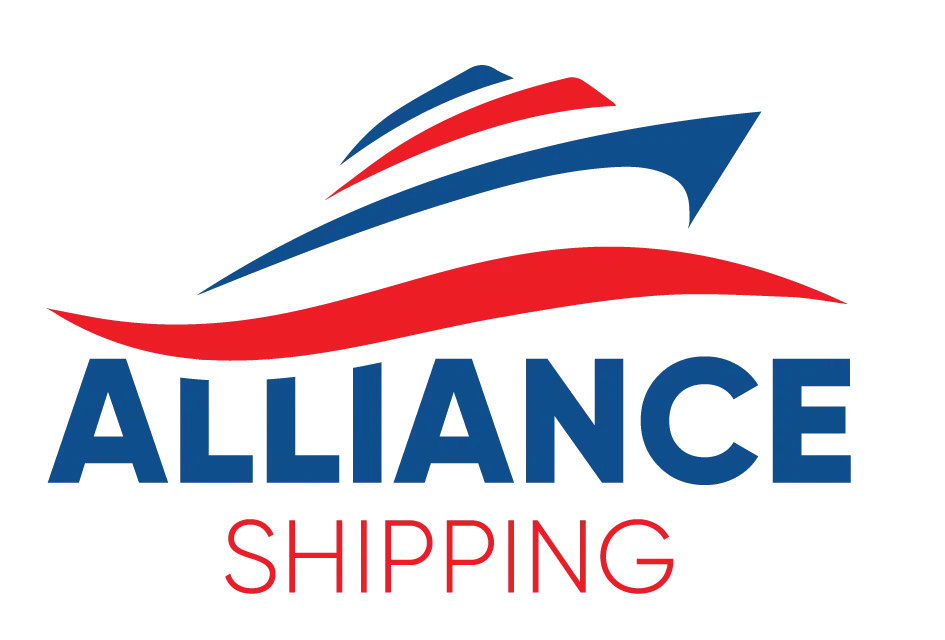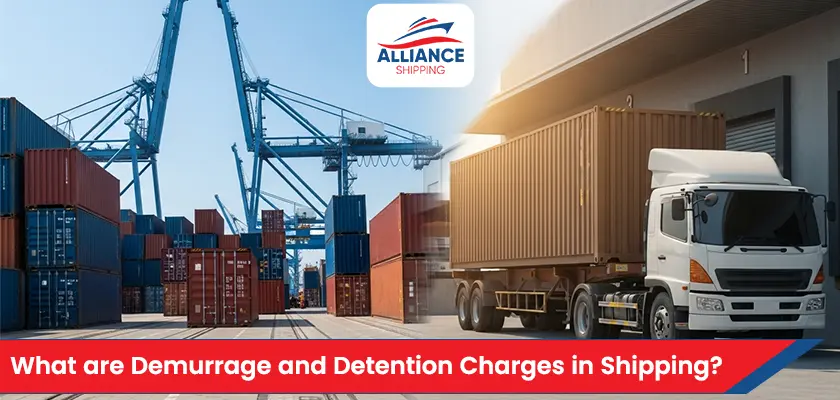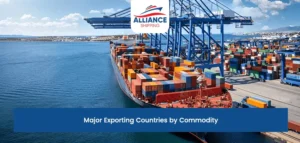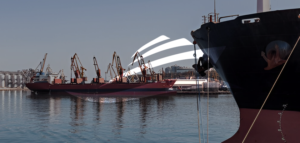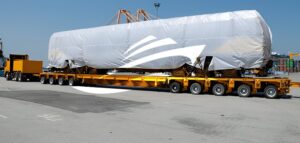Every year, Jebel Ali Port handles a massive flow of cargo. According to DP World, which manages operations at Jebel Ali, the port has an annual capacity of 19.4 million TEUs. That is equal to nearly 19 million standard 20-foot containers, spread across four terminals, 100 berths, and a 25-kilometre quay length.
And that is only about Jebel Ali Port in Dubai, UAE. Now, imagine the combined volume of containers moving through ports worldwide, and how quickly it all adds up. And then if those containers are not moving on time, the delays create serious congestion and rising costs.
To prevent prolonged congestion, the industry uses “demurrage and detention charges”.
In this blog, Alliance Shipping will explain what these charges mean, why they exist, how they are applied, and most importantly, how you can avoid them.
The Concept of Free Days in Ports
Before we get into demurrage or detention charges, there is an important concept of “free days” to understand.
When an importer’s or exporter’s containers arrive at any seaport, they cannot be moved out right away. The containers are first parked in the terminal yard (an area where containers are stored temporarily) using cranes and specialized handling equipment.
Once they are parked, the importer or their clearing agent manages the documentation process, handles customs clearance, pays customs duties, and arranges transport. All of this takes considerable time and coordination.
So, to give importers and exporters a fair chance to complete these formalities, shipping lines provide a limited number of free days. During these free days, you are not charged anything for keeping the containers at the port or for using the shipping line’s equipment.
At Jebel Ali Port in Dubai, shipping lines usually allow 5 to 7 free days.
What are Demurrage Charges?
Demurrage is a fee charged by the shipping line when your container stays at the port terminal beyond the allowed free days. After your cargo is unloaded from the vessel, it is placed in the terminal yard.
You are given a set number of “free days” to take care of customs clearance, pay duties, and arrange transport to move the container out of the port (gated out). If the container is not picked up within this free period from the terminal yard, demurrage charges apply.
For example, if your container arrives at Jebel Ali Port and the shipping line gives you 7 free days, but your customs process takes 10 days, you will pay demurrage fees for the extra 3 days that the container stayed inside the terminal yard.
These charges are calculated on a per-day, per-container basis, usually measured in TEU (20-foot equivalent units).
What are Detension Charges?
Detention is a fee charged by the shipping line when you keep their container outside the port longer than the allowed free days. Once you pick up the container from the terminal yard and move it to your warehouse, factory, or any other location, the free time for using that container starts.
For example, let’s say your container arrives at Jebel Ali Port, and the shipping line gives you 5 free days to unload the cargo and return the empty container to their depot. If you take 8 days instead of 5, you will be charged detention fees for the extra 3 days.
Just like demurrage, detention is calculated on a per-day, per-container basis. The longer you hold on to the shipping line’s container, the higher the cost becomes.
Difference Between Demurrage and Detention Charges
Demurrage and detention are related, but they apply at different stages of the shipping process. Many businesses confuse them, which leads to unexpected costs.
Demurrage → Charged when your container stays too long inside the port terminal before you pick it up.
Detention → Charged when you keep the container outside the port for too long before returning it.
Why Do Demurrage and Detention Charges Exist?
Ports have limited space, and thousands of containers move in and out every day. Jebel Ali alone handles nearly 19 million containers every year. If importers and exporters leave their containers sitting too long, they block space that is needed for incoming shipments.
That is why the industry introduced demurrage and detention charges. These charges encourage shippers to move their cargo as quickly as possible, so that new containers can be placed in the terminal yard without delays.
How are Demurrage and Detention Charges Calculated?
There are no fixed costs for demurrage and detention charges, as each port and shipping line sets its own rules. The total charges depend on a few key factors, such as:
- Time: Once the free days are over, charges begin to accumulate for every extra day (or even hour) your container stays at the port.
- Cargo type: Special goods like hazardous materials or items requiring special storage often come with higher demurrage fees.
- Port and Shipping Line Rules: Each port and shipping line has its own agreement for free days, penalties, and the way charges are calculated.
- Payment flow: Demurrage charges are typically paid to the shipping line, which then allocates a portion of the fee to the port authority based on their agreement.
For example, if a shipping line charges $100 per day for demurrage and your container stays at Jebel Ali Port 3 days longer than the free period, you would have to pay $300 in demurrage charges.
Save on Demurrage and Detention Charges
No one wants to pay demurrage or detention charges. While it may seem easy to move containers within the free days, that’s not always the case. Sometimes the days are too short, and factors like holidays, strikes, or bad weather can use them up, leading to fees.
At Alliance Shipping, we always make sure our containers do not get stuck, and we recommend the same approach for you. Here’s what we have been doing to avoid any demurrage and detention costs.
The first step is to clear planning. We prepare all shipping documents before the cargo arrives, so customs clearance and duty payments do not cause unnecessary delays. Then, we coordinate with transport. We arrange trucks or other transport in advance to move containers out of the port quickly and return empty ones on time.
Lastly, we suggest you stay in close communication with your shipping line and port agents. This helps you stay informed about any changes, and being updated on free days, port rules, and working hours ensures you know exactly how much time you have.
Consequences of Not Paying Demurrage and Detention Charges
There are consequences when you don’t pay the pending demurrage and detention charges. Firstly, your costs are rising with every day your containers are in the terminal yard. This delay also affects your supply chain, causing late deliveries and slowing down business operations.
In some cases, shipping lines or ports may hold your cargo until the fees are cleared. If payments are delayed for too long, they can even sell or dispose of the goods to recover their costs.
Also, frequent issues with demurrage and detention may make shipping lines see you as a risky customer, which can reduce your flexibility in future deals. So, it’s always best to pay any pending charges instead of ignoring them.
Conclusion
In the end, demurrage and detention charges are all about keeping cargo moving on time. If you plan ahead, prepare your documents early, and return containers within the free days, you can avoid these extra costs.
If you need shipping services from Dubai to the GCC or anywhere globally, reach out to us. Alliance Shipping is one of the trusted shipping companies in Dubai, and we would be glad to serve you. You can contact us at +971566495103 or email us at manager.dxb@theallianceshipping.com.
